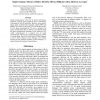Free Online Productivity Tools
i2Speak
i2Symbol
i2OCR
iTex2Img
iWeb2Print
iWeb2Shot
i2Type
iPdf2Split
iPdf2Merge
i2Bopomofo
i2Arabic
i2Style
i2Image
i2PDF
iLatex2Rtf
Sci2ools
113
click to vote
AAAI
2000
2000
Semantics of Agent Communication Languages for Group Interaction
Group communication is the core of societal interactions. Therefore, artificial agents should be able to communicate with groups as well as individuals. However, most contemporary agent communication languages, notably FIPA and KQML, have either no provision or no well-defined semantics for group communication. We give a semantics for group communication that we believe can profitably enrich the agent communication languages. In our semantics, individual communication is a special case of group communication wherein each communicating group consists of a single agent. One of the novel features of this semantics is that it allows senders to send messages even without knowing all the potential recipients of those messages
AAAI 2000 | Agent Communication Languages | Group Communication | Intelligent Agents | Well-defined Semantics |
Related Content
| Added | 01 Nov 2010 |
| Updated | 01 Nov 2010 |
| Type | Conference |
| Year | 2000 |
| Where | AAAI |
| Authors | Sanjeev Kumar, Marcus J. Huber, David McGee, Philip R. Cohen, Hector J. Levesque |
Comments (0)

